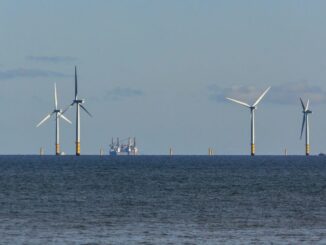
-
Impairment Charges:
-
Ørsted announced a total impairment of 28.4 billion Danish kroner (DKK) (approximately $4 billion USD or €3.8 billion EUR) for the first nine months of 2023, largely due to the cancellation of these two projects. Of this, $2.8 billion USD was specifically attributed to Ocean Wind 1.
-
The company also indicated that total impairments could reach up to 39.4 billion DKK (approximately $5.58 billion USD) when including additional provisions for contract cancellation fees and other costs.
-
-
Provisions for Cancellation Fees:
-
Ørsted estimated additional provisions of 8 to 11 billion DKK (approximately $1.1 to $1.5 billion USD) in the fourth quarter of 2023 to cover potential contract cancellation fees not already included in the impairment charges. These provisions exclude any potential reuse value of contracted equipment.
-
-
Settlement with New Jersey:
-
In May 2024, Ørsted agreed to pay New Jersey $125 million USD to settle claims related to the cancellation of Ocean Wind 1 and Ocean Wind 2. This amount was significantly less than the $300 million USD in guarantees Ørsted had initially committed to, which included a $100 million guarantee for Ocean Wind 1 completion by 2025 and $200 million for offshore wind industry development in the state.
-
-
In January 2025, Ørsted reported a write-off of approximately $1.7 billion USD related to its 924-megawatt Sunrise Wind project off the U.S. New England coast. This write-off was noted in the context of a pause in development, though the project was not canceled and construction had begun in 2024.
-
In May 2025, Ørsted canceled the Hornsea 4 project, a 2.4-gigawatt offshore wind farm in the UK, citing uneconomic conditions despite a 15-year government contract. While specific write-off amounts for Hornsea 4 were not detailed in the provided sources, the cancellation was noted as a significant setback, and Ørsted’s history of write-offs suggests potential financial impacts. The company stated it would retain development rights to potentially advance the project later under better economic conditions.
-
Ocean Wind 1 and 2: Approximately $4 billion USD in impairments, with potential total impairments up to $5.58 billion USD including provisions for cancellation fees.
-
Sunrise Wind: Approximately $1.7 billion USD in write-offs.
-
Hornsea 4: No specific write-off amount reported, but likely to contribute to financial losses given the project’s scale and Ørsted’s prior write-off patterns.
-
Supply Chain Issues: Delays and bottlenecks in the global offshore wind supply chain increased project costs.
-
Rising Interest Rates: Higher borrowing costs made financing projects more expensive.
-
Inflation: Skyrocketing costs for raw materials and construction impacted project viability.
-
Insufficient Government Support: In the U.S., Ørsted noted a lack of adequate tax credits and issues with permitting timelines. In the UK, even government-guaranteed prices for Hornsea 4 were insufficient to offset costs.
-
Ørsted’s financial struggles have led to broader strategic changes, including job cuts (approximately 800 positions), suspension of dividends for 2023–2025, and withdrawal from other markets like Norway.
-
Despite these cancellations, Ørsted remains committed to some U.S. projects, such as the Revolution Wind project (704 MW), which proceeded with a final investment decision despite a $465 million USD impairment.
-
The offshore wind industry globally is facing a “perfect storm” of economic challenges, with other companies like BP and Vattenfall also reporting significant write-downs or project cancellations.
Danish offshore wind developer Ørsted has discontinued the Hornsea 4 offshore wind project in the UK, citing rising costs and increased risks for development.
The Danish firm said that, since the contract for difference (CfD) award in September 2024, the 2.4GW Hornsea 4 project had seen several adverse developments relating to continued increase of supply chain costs, higher interest rates, and an increase in the risk to construct and operate the project of this size on the planned timeline.
Ørsted claimed that this increased the execution risk and deteriorated the value creation of the project, so the company decided to stop further spending at this time and terminate the project’s supply chain contracts. This means that the offshore wind developer will not deliver Hornsea 4 under the CfD awarded in allocation round 6.
“Ørsted will evaluate options for future development of the Hornsea 4 project given the continuing seabed rights, grid connection agreement, and development consent order,” the company explained in a statement.
As a consequence of the decision, Ørsted expects to incur breakaway costs of DKK 3.5-4.5bn ($533m-$685m) in 2025. The EBITDA impact is expected to be DKK 3-3.5bn ($457m-$533m), which includes a write-down of the offshore transmission assets and a provision for contract cancellation fees. The company will also write down capitalised construction costs of around DKK 500m-1bn ($76m-$152m).
”[…] Our capital allocation is based on a strict and value-focused approach, and after careful consideration, we’ve decided to discontinue the development of the Hornsea 4 project in its current form, well ahead of the planned final investment decision later this year,” said Rasmus Errboe, president and CEO of Ørsted.
He added that the adverse macroeconomic developments, continued supply chain challenges, and increased execution, market, and operational risks have eroded the value creation.
“We’ll keep the project rights for the Hornsea 4 project in our development portfolio, and we’ll seek to develop the project later in a way that is more value-creating for us and our shareholders,” Errboe concluded.







